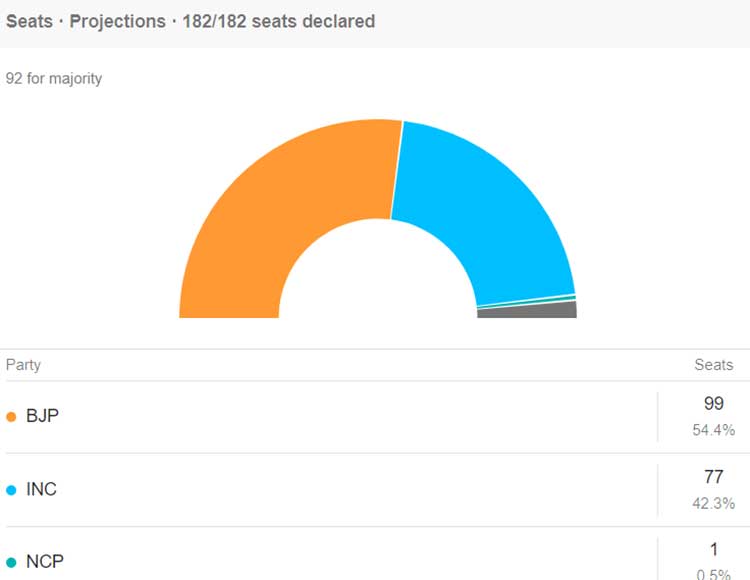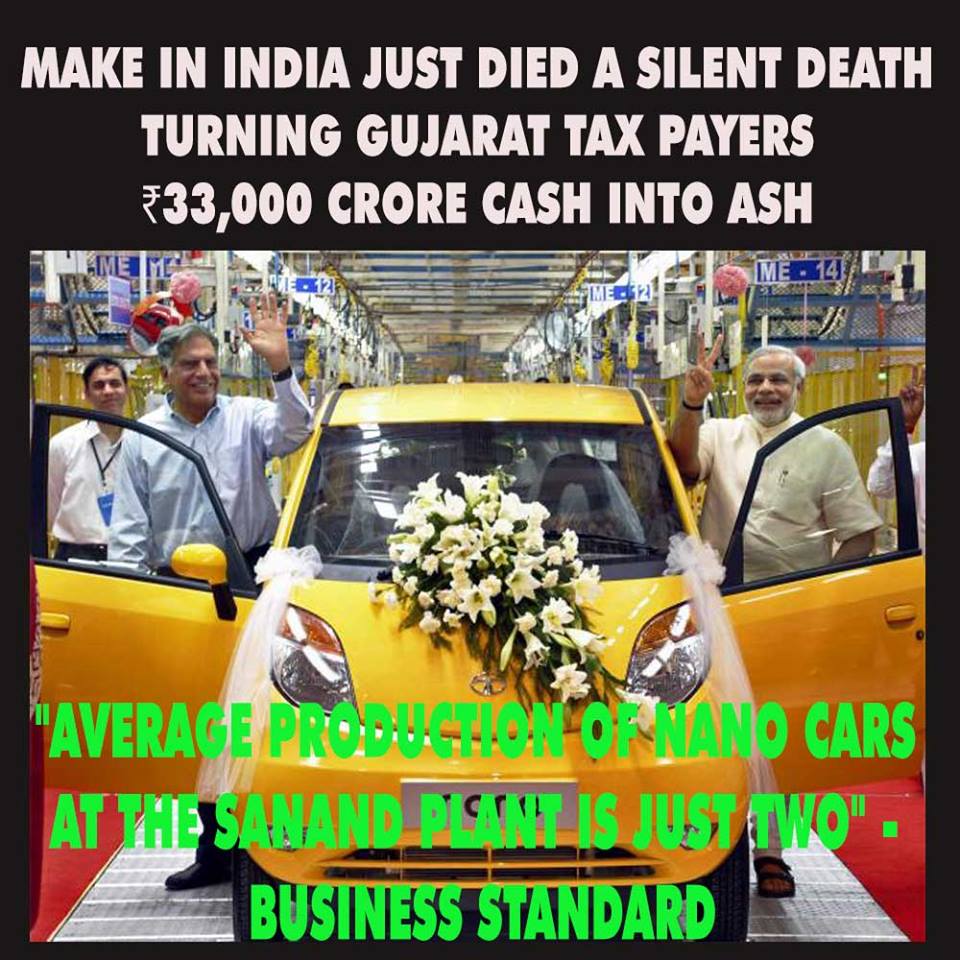
What can be done of politics that is dangerous and easy? The opinion polls show that Congress and BJP are neck to neck in the upcoming Gujarat assembly polls. Will the violence of Rajsamand and similar communal politics wash off the terror of demonetization, of GST, of Una Dalits flogging, of unemployment woes of Patidars and Thakors?
At the time of pressing that button, who is the Other that the voter will vote against? Who is the common enemy of Gujarat that is keeping the state from promises of progress and economic boom?
It needs a very level-headed voter to know the enemy, to recognize it and try to combat it.
It is said that Modi’s personae is going to be the win factor for BJP this time. The battle is personal, much like Bengal’s recent assembly election where Mamata Banerjee’s face was supposed to be the face of every seat contested. This was an attempt to calm the storms raked by the Narada scam, Sarada scam etc. Similarly Modi is still being presented as Mr. Dependable, even though it was his government that imposed the menace of demonetization and GST among other diktats. In Bengal, people forgot the scams and anti poor policies of the government (like the Bhangar unrest, tea workers agitation) and voted for TMC because of the lack of a credible alternative.
This time in Gujarat that is not the case. It is harder to forget the Una incident because it produced an alternative in the form of a Jignesh Mevani who has support from Dalit sections. It is harder to forget GST and demonetization because the impact has been mass scale and the injuries are yet to heal. For a reminder of the grim state of unemployment there are strong voices of the Patidars (Hardik Patel) and the Thakors (Alpesh Thakor). And who can forget the plight of the farmers and their daily struggle against rising loans and dwindling profits? Alpesh Thakor representing the OBC has been a prominent figure in the farmer agiations in Gujarat. Now, all these faces, and struggles seem to have united like huge tide, to fight the common enemy, the BJP.
So is Modi’s charisma going to see him through this huge hurdle? Can he somehow give a narrative to the voters where he ceases to be the common enemy?
When Gujarat burnt in 2002 Modi came out as a person who was a man of his words, a strong masculine figure who could lead the Hindu nation and fight the common enemy, Muslims. He stood opposed to the weak ,weather cock secular politics of Congress. When it came to fighting the prime ministerial elections he was projected as the humble chai wallah as opposed to the Shehzada dynastic rule of the Congress. This time, Modi who has to face the ire of the farmer, trader, Dalit, OBC must try to change the pitch. Let’s begin by calling the unison of Hardik, Alpesh and Jignesh as ‘HAJ’. If BJP is smart at anything it is at coming up with new acronyms.
Few can beat the BJP in playing communal politics. Since 2014, they have been promoting Hindutva, through beef ban, love-jihad, illegal Bangladeshi immigrants theory, Ayodhya temple issue and of course the ace card, commemorating Babri Masjid demolition (marking 25 years of Hindu pride!). Modi must project himself once again the true patriot, the real man, the devout Hindu who can protect the country and the state from the predator Muslims and sickulars of the country. His Gujarati credentials will give him a boost but as far as image creation goes, the chai walla has receded to the background.
There isn’t lack of political will to stop communal violence over the beef ban. The political will is in the silence that is maintained such that the fire of communal hatred keeps burning. There is a deliberate attempt to misguide people into believing that their socio-economic woes arise from the presence of Muslims in the country. The consciousness of Hindu pride, nationalism which is jingoistic, conflation of territory with religious identity is poisonous politics that BJP has been at for a while. It is easy to manipulate people’s economic woes and social struggles and give it communal colours and let the public decide. It is easy and extremely dangerous. This we have seen repeatedly in the murders of Akhlaq, Pehlu Khan, Junaid, Afrazul among others. Sometimes in the name of beef or train seats or love-jihad.
The perception in the mind of the public is the most important one to control and BJP has all the reins in its hands. The fear psychosis that, come Congress, India will become another Islamic state is fanned frantically by the RSS sevaks. That the lost glory of Hindustan will be recovered once BJP comes to power is a hope that most want to hang on to. The ‘hope’ which is a toxic combination of desperation and delusion, is the carrot that is dangled under the noses of the majority community who are fooled into believing the cheap political tactics of the ruling party.
So the common enemy must be those like Afrazul who are out to marry our innocent Hindu girls. They will radicalize them and turn them against their own country. Look at the Hadiya case! Even the Supreme Court is discussing love-jihad. We must stop these jihadi Romeos for it is our patriotic duty to protect the nation from Muslim invaders. And of course since it is an act which is justifiable and note-worthy, we have the guts to record it and put it on the internet too. The violence is normalized and legitimized in the grand narrative. For briefest time, one may ponder over the barbarity of the act, till the next so-called love jihad case comes up. Communal politics actually hands down the law and order baton to the mob (members of the majority community) from the state (also the mob?). The mob united in hatred, pronounces the judgment. In a country where 80% make up for the Hindu population (including the Dalits and SCs) it is the easiest trick in the book of electoral politics. Forget caste and economic woes, do you want to vote for a party that will sell of the country to the Muslims?
Modi needs to keep playing on the communal lines to win. His economic debacles and insensitive government policies will be over looked if there is a credible communal plot at hand. The Hindutva logic has become a part of the system and Modi does not need to orchestrate riots anymore, they will happen on their own. He does not need to actively instigate Hindus against the Muslims. But can the country sustain such ill-feeling for short term political gain?
The love-jihad attack or the murder of an ordinary Muslim man in Rajsamand will serve as a timely reminder to the Hindu voter. As will the mandir issue of Ayodhya which is now being heard at the Supreme Court. Godhra riots ensured that the BJP came back by a resounding victory as did the Muzzafarnagar riots of 2013. Will the recent attack on Afrazul (and others) have a similar impact? My hunch is that it will, favourably so for BJP.
Will the Thakors, Patels, Dalits, small farmers and traders be able to challenge the tide of communal sentiments with common logic – for their economic and social backwardness? When the voter goes to vote (the ones yet to decide, at least) they are driven by sentiments of fear, pride, duty, private gain, anger etc. It is the work of magician to tie up all these sentiments into one simple narrative which gives the voter one answer. Modi has proven it earlier too, that he can be that magician.
Debjanee Ganguly is a research scholar in JNU













































